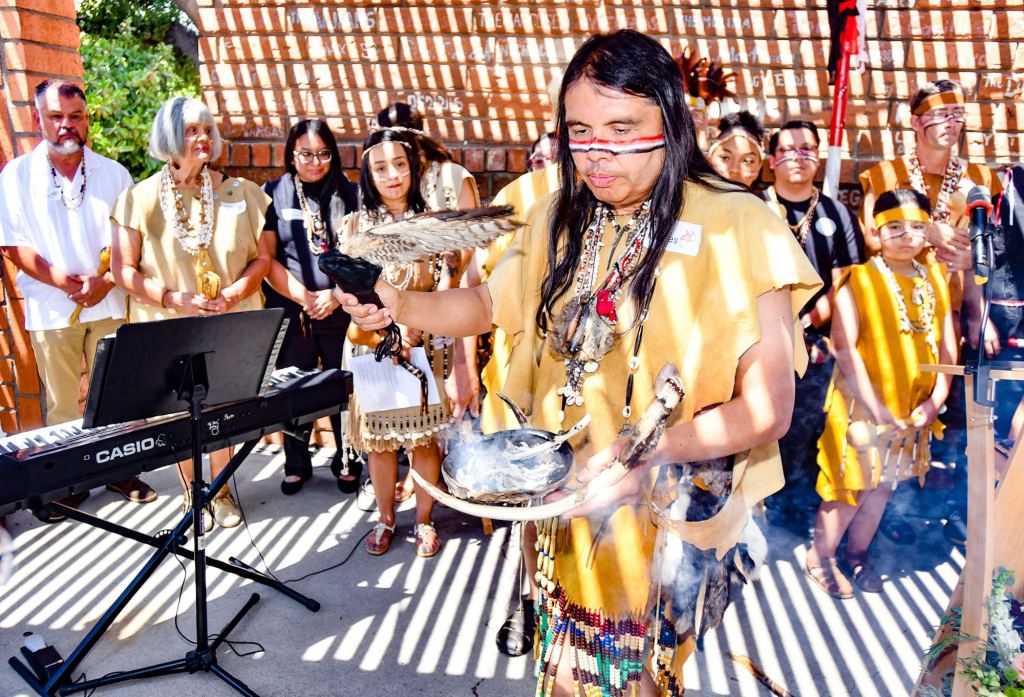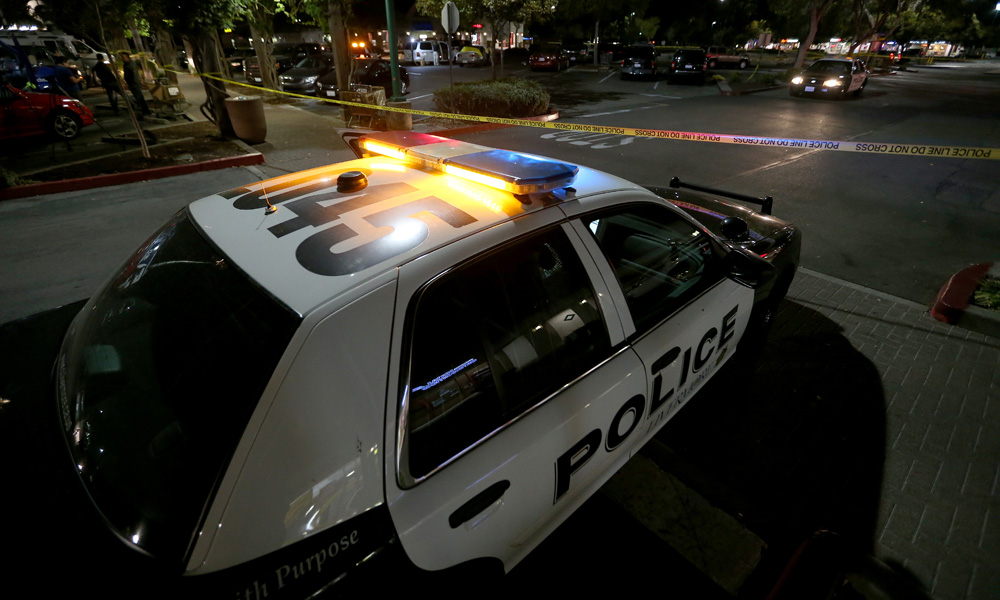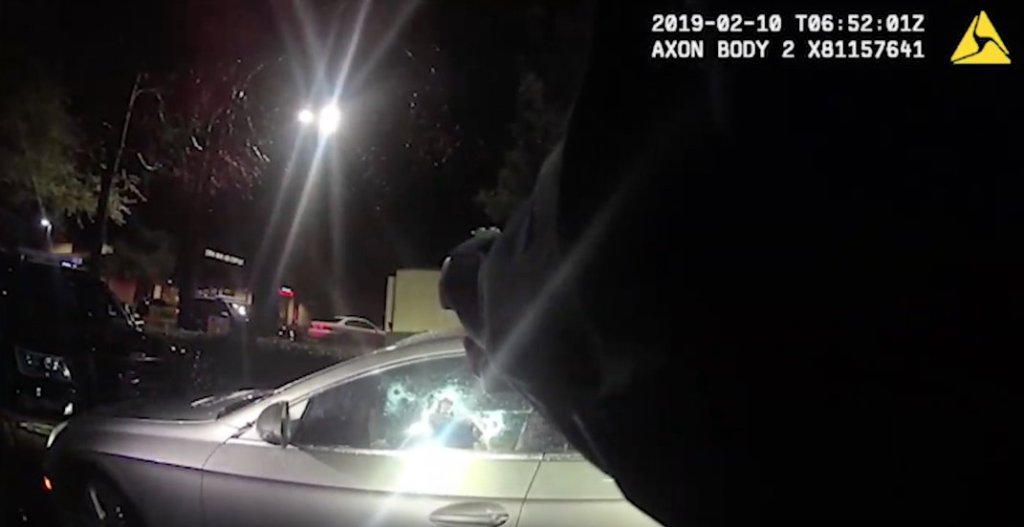In what they called a “groundbreaking act of reparative justice,” Presbyterian church leaders from the San Gabriel Valley returned centuries-old ancestral Indigenous land to its original caretakers.
The Presbytery of San Gabriel returned original Tongva land, once the site of a sacred village later used by the church, back to the Gabrieleno Tongva tribe, part of the San Gabriel Band of Mission Indians.
The historic return marked the first-ever land transfer from a church to a recognized Indigenous tribe in California history, officials said.
The returned land, around a half-acre parcel, is less than one mile from the newly restored Mission San Gabriel Arcángel, and is the current office headquarters for the Gabrieleno Tongva Tribal Council.
Leaders called the site Siban’gna, part of the Gabrieleno Tongva’s ancestral village.
Tribe and Presbytery church leaders, elected officials and community members gathered for an open-house event and worship service on August 2 to honor the land return. The public was invited to the historic celebration, which included a land acknowledgement, blessing and sermon, a symbolic gift exchange, and traditional Gabrieleno Tongva dances.
“This is more than a gift, it’s a recognition of truth, history and healing,” said Gabrieleno Tongva Chief “Redblood” Anthony Morales. Before the ceremony, Morales said it was a special day for the tribe, which has had a long history of involvement with the Presbyterian Church.
“This is our tribal headquarters now. We’re very grateful to the Presbyterian Church for correcting the wrong that was imposed on our people,” said Morales, who got married at the church next to the returned land.
The land return honors the area’s complex history, built on Indigenous labor. During the late 18th and 19th centuries, Spanish missionaries claimed land originally inhabited by Native people, and used them as enslaved labor to build up churches in the California mission system, according to the state’s Native American Heritage Commission. Around 1771, when Mission San Gabriel was founded by Spanish Franciscans, the Tongva people were conquered, used to build the mission, and were given the name of “Gabrieleño.”
Presbyterian Rev. Wendy Tajima gave remarks at the event, framing the transfer as “both a spiritual and political reconciliation.” Leaders say this act highlights a growing movement among faith institutions to confront colonial legacies through tangible restoration.
The parcel of land was previously the La Casa de San Gabriel Community Center, founded by local Presbyterian pastor César Lizárraga and his wife Angelita, which served the local Latino community, among others, for nearly 80 years as a mission of the presbytery, officials said.
The tribe rented a small office on the land for over 40 years, leaders said.
In its original form, the Siban’gna sacred village would have been filled with many Gabrieleno Tongva people together in community, living off the land, helping each other and living in “respect, reciprocity and reverence with Mother Earth,” tribal member and Secretary Kimberly Morales Johnson said.
“May we strive for reconciliation and cultivate a harmonious relationship with the land and its original caretakers, promoting justice and equality for all,” a line from the land acknowledgment read.
Several hundred attendees joined the August 2 celebration and worship service in a large courtyard. They wandered the area, which includes a campus that houses three buildings. People received white sage bundles and Indigenous prayer knots and for kids, there were interactive activities learning about Tongva history and culture.
A large garden of native Californian plants — including elderberry and white sage, used for tribal medicines and cultural practices — is being grown on the land, which was also blessed.
Gabrieleno Tongva tribal members performed a traditional canoe and dolphin dance, as well as a bird and clapper song.
As the Gabrieleno Tongva Tribal Council’s official headquarters, organizers said, the land will be used for all tribal ceremonies, gatherings, and education opportunities.
“Our intention as a tribe is to use this space as a home for now and future generations; a place where we can gather, learn, share,” said tribe community leader Mona Morales Recalde.
Tribal leaders first began the process of getting the land back in November 2024, after decades of being involved with the San Gabriel Presbytery. Once they learned the space would be made available, Recalde described the process as “a collaborative effort” between the church and tribe, with church officials being open to the idea of returning the land from the first inquiry.
The deed was returned specifically to the Gabrieleno Tongva Tribal Council, officials said. A title transfer was recorded in L.A. County on July 10 of this year, said Rev. Tajima.
Returning the property was one step of atonement for the “historic harm” Gabrieleno Tongva people endured, Tajima said; after they were stripped of “ancestral land (and) unjustly deprived.”
San Gabriel Mayor Denise Menchaca, San Gabriel Councilmember John Wu, and Rep. Judy Chu (CA-27) were all in attendance for the historic land return.
“To see this moment happen is just truly incredible,” Chu said at the event. “It’s impossible to fully appreciate today without acknowledging the painful history that came before it.”
Native people like the Tongva endured “displacement, forced labor, and loss of language and land,” she acknowledged. “It’s not just a return of land — it’s a return of dignity, connection and recognition.”
Chu and leaders from the San Gabriel Band of Mission Indians also worked together to urge expansion of the San Gabriel Mountains National Monument under the Obama and Biden administrations.
L.A. resident Bertha Fraire, who is from the Cherokee Nation, came to the celebration wanting to “witness this historic moment” and support her fellow Native American people. She was honored and proud for the Gabrieleno Tongva council.
“It’s very important for us to support one another,” Fraire, 42, said. “Natives acknowledge the land that we stand on always, traditionally paying homage and being grateful for the water, for mother nature, for our elders and their wisdom.”
While the Gabrieleno Tongva nation has been recognized by the state and the city of Los Angeles, the tribe has not been officially granted federal recognition as a sovereign nation, and continues that fight, organizers said. This would allow more control over resources and for them to self-govern. The federal government acknowledges the tribe under the Mission Indian Agency, but has not granted federal recognition, according to the tribe.
La Puente resident Mason Rico has been connecting with his Indigenous heritage recently and came with his uncle, Jose Gallardo. Both are Gabrieleno Tongva tribe members.
“This land going back to us brings me joy because I never knew this could happen,” Rico, 14, said. “It’s a key moment in history that I can grab. I never thought I could learn my history that was taken away from me.”
Added Rico, “This is our land, and it shows that just because the White man took it over a long time ago, doesn’t mean we can’t get it back. This shows our history is alive… (not) just another page in the history book. We’re still here.”
<











